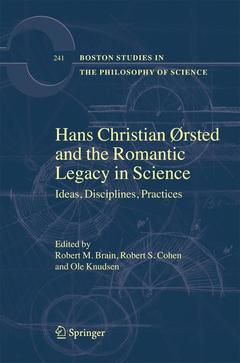Description
Hans Christian Ørsted and the Romantic Legacy in Science, 2007
Ideas, Disciplines, Practices
Boston Studies in the Philosophy and History of Science Series, Vol. 241
Coordinators: Brain Robert M., Cohen Robert S., Knudsen Ole
Language: English
Subject for Hans Christian Ørsted and the Romantic Legacy in Science:
Keywords
Hans Christian Ørsted and the Romantic Legacy in Science
Publication date: 08-2016
Support: Print on demand
Publication date: 08-2016
Support: Print on demand
Hans christian oersted and the romantic quest for unity: ideas, disciplines, practices
Publication date: 10-2007
442 p. · 15.5x23.5 cm · Hardback
Publication date: 10-2007
442 p. · 15.5x23.5 cm · Hardback
Description
/li>Contents
/li>Comment
/li>
This volume owes its origin to the perception of a puzzling paradox. Hans Christian Ørsted, the great Danish scientist and philosopher, was one of the founders of modern physics through his experimental discovery in 1820 of the interaction of electricity and magnetism?a key step and model for the further unification of the forces of nature. Followers such as Maxwell and Einstein were, and today searchers worldwide are, enchanted by the hope for a completion of that grand program. In addition to Ørsted?s discovery of electromagnetism, his work in science included other fields, chiefly high-pressure physics and acoustics. Moreover, he belonged to that fascinating group of seekers who were deeply engaged in the Romantic tradition of the Nature Philosophers, influenced by Immanuel Kant and by religious, literary, and aesthetic currents. The scientific and philosophical speculations by Ørsted and his circle also quickly stimulated the imagination of other philosophers and scientists. Among the latter were prominently André-Marie Ampère and Michael Faraday, whose work launched the transformation of civilization often called the Second Ind- trial Revolution, based on the invention of motors, generators, and the pervasi- ness of electricity in modern life.
The Way From Nature To God.- The Other Side Of Ørsted: Civil Obedience.- The Making Of A Danish Kantian: Science And The New Civil Society.- Phrenology And Danish Romanticism.- Natural Ends And The End Of Nature.- The Influence Of Kant's Philosophy On The Young H. C. Ørsted.- Ørsted's Concept Of Force And Theory Of Music.- Kant—Naturphilosophie—Electromagnetism.- Steffens, Ørsted, And The Chemical Construction Of The Earth.- The Culture Of Science And Experiments In Jena Around 1800.- The Romantic Experiment As Fragment.- Ørsted And The Rational Unconscious.- Romanticism And Resistance: Humboldt And “German” Natural Philosophy In Napoleonic France.- Between Enlightenment And Romanticism: The Case Of Dr. Thomas Beddoes.- Ørsted's Presentation Of Others'—And His Own—Work.- Ørsted, Ritter, And Magnetochemistry.- Ørsted's Work On The Compressibility Of Liquids And Gases, And His Dynamic Theory Of Matter.- Hans Christian Ørsted's Spiritual Interpretation Of Natural Science.- The Spiritual In The Material.
Includes supplementary material: sn.pub/extras
© 2024 LAVOISIER S.A.S.




